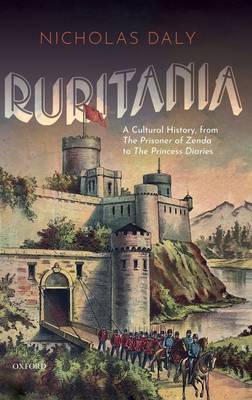
- Retrait gratuit dans votre magasin Club
- 7.000.000 titres dans notre catalogue
- Payer en toute sécurité
- Toujours un magasin près de chez vous
- Retrait gratuit dans votre magasin Club
- 7.000.0000 titres dans notre catalogue
- Payer en toute sécurité
- Toujours un magasin près de chez vous
Ruritania
A Cultural History, from the Prisoner of Zenda to the Princess Diaries
Nicholas Daly
Livre relié | Anglais
85,45 €
+ 170 points
Description
This is a book about the long cultural shadow cast by a single bestselling novel, Anthony Hope's The Prisoner of Zenda (1894), which introduced Ruritania, a colourful pocket kingdom. In this swashbuckling tale, Englishman Rudolf Rassendyll impersonates the king of Ruritania to foil a coup, but faces a dilemma when he falls for the lovely Princess Flavia. Hope's novel inspired stage and screen adaptations, place names, and even a board game, but it also launched a whole new subgenre, the "Ruritanian romance". The new form offered swordplay, royal romance, and splendid uniforms and gowns in such settings as Alasia, Balaria, and Cadonia. This study explores both the original appeal of The Prisoner of Zenda, and the extraordinary longevity and adaptability of the Ruritanian formula, which, it is argued, has been rooted in a lingering fascination with royalty, and the pocket kingdom's capacity to hold a looking glass up to Britain and later the United States. Individual chapters look at Hope's novel and its stage and film adaptations; at the forgotten American versions of Ruritania; at the chocolate-box principalities of the musical stage; at Cold War reworkings of the formula; and at Ruritania's recent reappearance in young adult fiction and made-for-television Christmas movies. The adventures of Ruritania have involved a diverse list of contributors, including John Buchan, P.G Wodehouse, Agatha Christie, Vladimir Nabokov, and Ian Fleming among the writers; Sigmund Romberg and Ivor Novello among the composers; Erich Von Stroheim and David O. Selznick among the film-makers; and Robert Donat, Madeleine Carroll, Peter Ustinov, Peter Sellers, and Anne Hathaway among the performers.
Spécifications
Parties prenantes
- Auteur(s) :
- Editeur:
Contenu
- Nombre de pages :
- 272
- Langue:
- Anglais
Caractéristiques
- EAN:
- 9780198836605
- Date de parution :
- 13-03-20
- Format:
- Livre relié
- Format numérique:
- Genaaid
- Dimensions :
- 157 mm x 236 mm
- Poids :
- 589 g

Les avis
Nous publions uniquement les avis qui respectent les conditions requises. Consultez nos conditions pour les avis.






